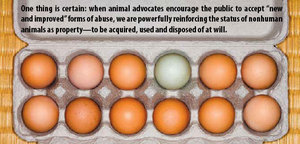On Collaborating with the Opposition

Michele at Peaceful Prairie Sanctuary sent me some links to James LaVeck (of Tribe of Heart) articles that I wish I had seen last May, during the days when I thought the banning of gestation crates would somehow lead to humans ceasing their slaughter and consumption of pigs and other nonhuman animals.
For some of us it’s now clear that collaborating with the opposition by advocating for minor (and debatable) improvements in farmed animal care such as sheds instead of cages for laying hens, is detrimental to our ultimate goal. In Truthiness is Stranger Than Fiction: The Hidden Cost of Selling the Public on Cage-Free Eggs, LaVeck (with the help of activist/author Bill Moyer) describes how leaders of a large, reform-focused organization might (and did/does) get themselves into a position where they’re sitting at the table with animal exploiters, basically negotiating for levels and degrees of suffering of nonhuman animals.
When the moral framework of a social justice cause is deliberately co-mingled with the utilitarian, profit-maximizing logic of an exploitative industry, what was once a natural adversarial relationship gets twisted into a dysfunctional marriage of convenience.
That marriage of convenience has resulted in the popularity of "cage-free" eggs, which are touted as humanely and sold to "conscientious omnivores" and vegetarians, who believe (they really do) that the laying hens are running around some idyllic place reminiscent of the Old McDonald’s farm from their childhood. And the only way the public could be so misinformed–so deluded–into thinking that "cage-free eggs are good for the animals and local farmers” is with the help of reform-minded organizations and their members.
But how can anyone blame well-meaning activists for contributing to the growing smorgasbord of mis- and dis-information? After all, they’ve been convinced by people they admire that if they tell the truth, they will not reduce suffering as much as by offering up the false reassurances of truthiness. They’ve been convinced that replacing one form of abuse with another is a viable path to ending exploitation.
As the core values and principles of the movement are perversely put in service of selling the very products of suffering and exploitation they were intended to abolish, people of integrity and goodwill become increasingly disoriented. They lose their ability to recognize they’ve been drawn into a destructive conflict of interest, mistaking it for “pragmatism” and “common sense.”
I like that LaVeck notes that many activists who endorse cage-free eggs as a viable option are well-meaning people of integrity. This is purely a matter of education. I promise you, people who buy cage-free eggs, and the activists who convince them that it’s okay to do so, have simply fallen for the genius PR campaign of not only egg producers, but large, national, "animal rights" organizations. This campaign they’ve concocted–as partners–has create a win-win for both the organization (by claiming victory, which is necessary for continuous fundraising) and the egg producer (who gets to charge more for, as LaVeck calls it, "New and Improved Abuse").
When we are willing to sacrifice the truth, to dilute its power in order to accrue short-term gains, however noble they may seem to be, we break free of our ethical moorings and begin to drift off course, inevitably carried away by the same currents that drive those caught up in exploitation.
I know there aren’t many of us who don’t believe that animals are ours to use and aren’t willing to compromise with their lives by accepting minor (and often debatable) improvements. Clearly, we have a lot of work to do and a long road ahead. Here are my two suggestions: e-mail the article referenced in this post to activist friends who think cage-free eggs are a legitimate step in the right direction, and send those activists, and non-activists who think they’re doing something wonderful by eating cage-free eggs, to The Free-Range Myth at PPS. (That’s my favorite because of the way it addresses what happens to male chicks and spent hens.)
What we need is a large-scale deprogramming effort, and it begins with you.




This is an awesome post, Mary! Thanks for pointing me to LaVecks's article.
Until a few months ago, I never really thought much about the welfarist approach versus the abolishionist approach. I just sort of went along with the welfarist ideal. Then I started reading your blog and reading other materials about the myths of cage-free and other humane labels. I really began thinking about this issue. How do I really feel? I like how Prof. Francione asked "what war are we winning?" (or something like that) when it comes to this issue. It really resonates with me! Deep down, since going veg, I've always been uncomfortable with applauding any sort of effort that supports the practice of animal use/abuse under the premise that it is "less cruel." I think the animal rights issue is confusing enough for most people, and having orgs like PETA say how wonderful Burger King is for serving 10% of their pork from gestation-crate free hogs, (and on and on!!), sends a very mixed message to people.
Anyway, thanks for all your great posts. I look forward to them every day!
I would like to thank you for a brilliant piece-thought provoking-informative. Few of us, no matter our cause, exhibit, live, write with such fervor! Proud!
Thanks, Colleen. And kudos to you for your work at Sentient Souls (http://www.sentientsouls.typepad.com/).
And, um, thanks mom. A bit over the top on the comment. A comment only a mother could write!
🙂